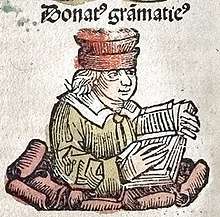Aelius Donatus
Aelius Donatus (English: /doʊˈneɪtəs/; fl. mid-fourth century AD) was a Roman grammarian and teacher of rhetoric. St. Jerome states in Contra Rufinum 1.16 that Donatus was his tutor.

Works
He was the author of a number of professional works, of which several are extant:
- A partly incomplete commentary on the playwright Terence is compiled from other commentaries, but probably not in its original form.
- His Life of Virgil is thought to be based on a lost Vita by Suetonius, together with the preface and introduction of his commentary on Virgil's works. A greatly expanded version of Servius' commentary exists, however, which is supplemented with frequent and extensive extracts from what is thought to be Donatus' commentary on Virgil.
- His Ars grammatica, especially the section on the eight parts of speech, though possessing little claim to originality, and evidently based on the same authorities which were used by the grammarians Charisius and Diomedes, attained such popularity as a schoolbook that, in the Middle Ages, he became the eponym for a rudimentary treatise of any sort, called a donet. When books came to be printed in the 15th century, editions of the little book were multiplied to an enormous extent. It is also the only purely textual work to be printed in blockbook form (cut like a woodcut, not using movable type). It is in the form of an Ars Minor, which only treats of the parts of speech, and an Ars Major, which deals with grammar in general at greater length.[1]
Donatus was a proponent of an early system of punctuation, consisting of dots placed in three successively higher positions to indicate successively longer pauses, roughly equivalent to the modern comma, colon, and full stop. This system remained current through the seventh century, when a more refined system due to Isidore of Seville gained prominence.[2]
Donatus invented the system whereby a play is made up of three separate parts: protasis, epitasis, and catastrophe.
Aelius Donatus should not be confused with Tiberius Claudius Donatus, also the author of a commentary (Interpretationes) on the Aeneid, who lived about 50 years later.[1]
References
- Chisholm, Hugh, ed. (1911). . Encyclopædia Britannica. 8 (11th ed.). Cambridge University Press. p. 411.
- M. B. Parkes, Pause and effect: punctuation in the west, 1993, ISBN 0-520-07941-8.
Further reading
- Daintree, David. 1990. "The Virgil Commentary of Aelius Donatus: Black Hole or 'Éminence Grise'?" Greece & Rome 37.1: 65–79.
- Demetriou, Chrysanthi. 2014. "Aelius Donatus and His Commentary on Terence’s Comedies." In The Oxford Handbook of Greek and Roman Comedy. Edited by Michael Fontaine and Adele C. Scafuro, 782–799. Oxford: Oxford Univ. Press.
- Dutsch, Dorota M. 2008. Feminine Discourse in Roman Comedy. Oxford: Oxford Univ. Press.
- Farrell, Joseph. 2016. "Ancient Commentaries on Theocritus’ Idylls and Virgil's Eclogues." In Classical Commentaries: Explorations in a Scholarly Genre. Edited by Christina F. Kraus and Christopher Stray, 397–418. Oxford: Oxford Univ. Press.
- Ferri, Rolando. 2016. "An Ancient Grammarian's View of How the Spoken Language Works: Pragmalinguistic Observations in Donatus' Commentum Terentii." In The Latin of the Grammarians: Reflections about Language in the Roman World. Edited by Rolando Ferri and Anna Zago. Turnhout: Brepols Publishers.
- Kragelund, Patrick. 2012. "Evidence for Performances of Republican Comedy in Fourth-century Rome." Classical Quarterly 62.1: 415–422.
- Maltby, Robert. 2003. "The Role of Etymologies in Servius and Donatus." In Etymologia: Studies in Ancient Etymology. Proceedings of the Cambridge Conference on Ancient Etymology, 25-27 September 2000. Edited by Christos Nifadopoulos, 103–118. Münster, Germany: Nodus Publikationen.
- McGill, Scott. 2014. "The Plagiarized Virgil in Donatus, Servius, and the Anthologia Latina." Harvard Studies in Classical Philology 107: 365–383.
- Murgia, Charles E. 2004. "The Truth about Vergil's Commentators." In Romane Memento: Vergil in the Fourth Century. Edited by Roger Rees, 189–200. London: Duckworth.
- Stok, F. 2012. "Commenting on Virgil, from Aelius Donatus to Servius." Dead Sea Discoveries 19.3: 464–484.
External links
| Library resources about Aelius Donatus |
| By Aelius Donatus |
|---|
- Vita Vergiliana, Aelius Donatus' Life of Virgil in the original Latin.
- Suetonius: The Life of Virgil, the Loeb English translation (which presumes that Donatus' Life "is almost wholly Suetonius’.")
- Virgil.org: Aelius Donatus' Life of Virgil translated into English by David Wilson-Okamura includes interpolated text not included in the Loeb translation
- Latin texts of some of Aelius Donatus, including the Ars Minor and all the parts of the Ars Major
- The commentary on Terence online
- Corpus Grammaticorum Latinorum: complete texts and full bibliography
- Commentum in Terentii Comoedias From the Rare Book and Special Collections Division at the Library of Congress